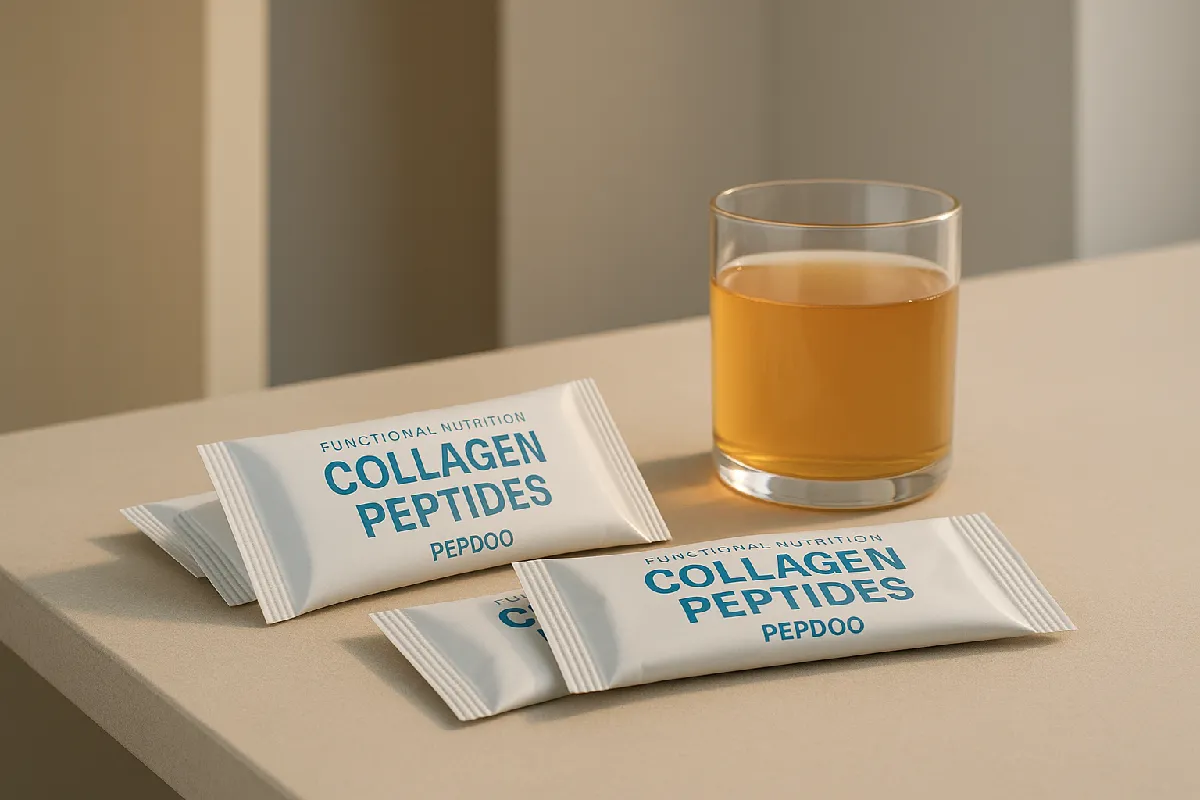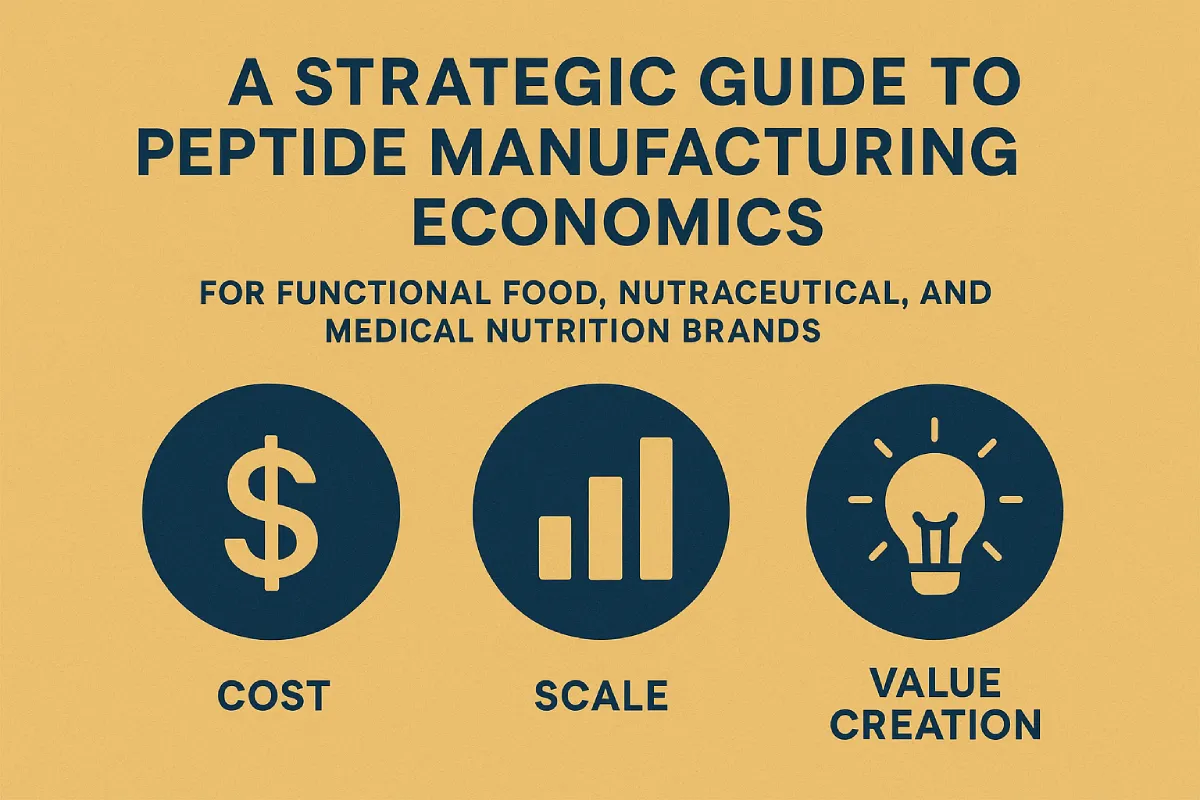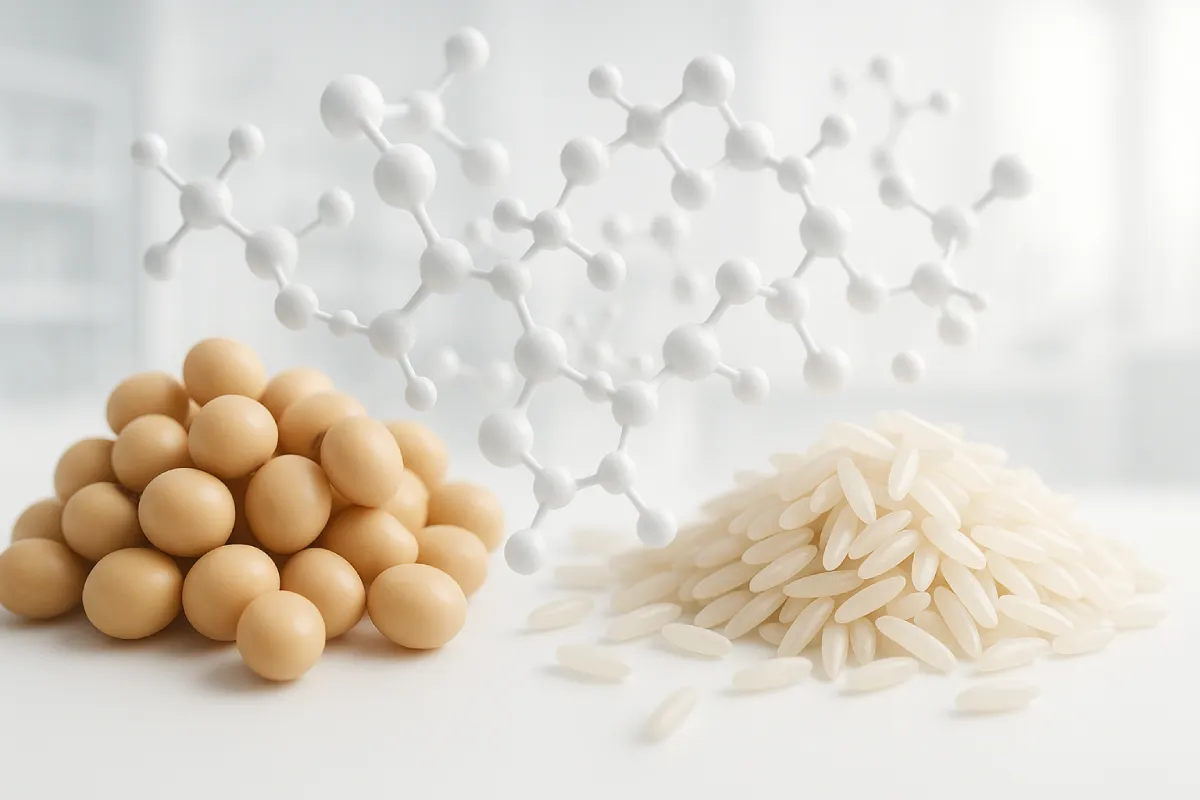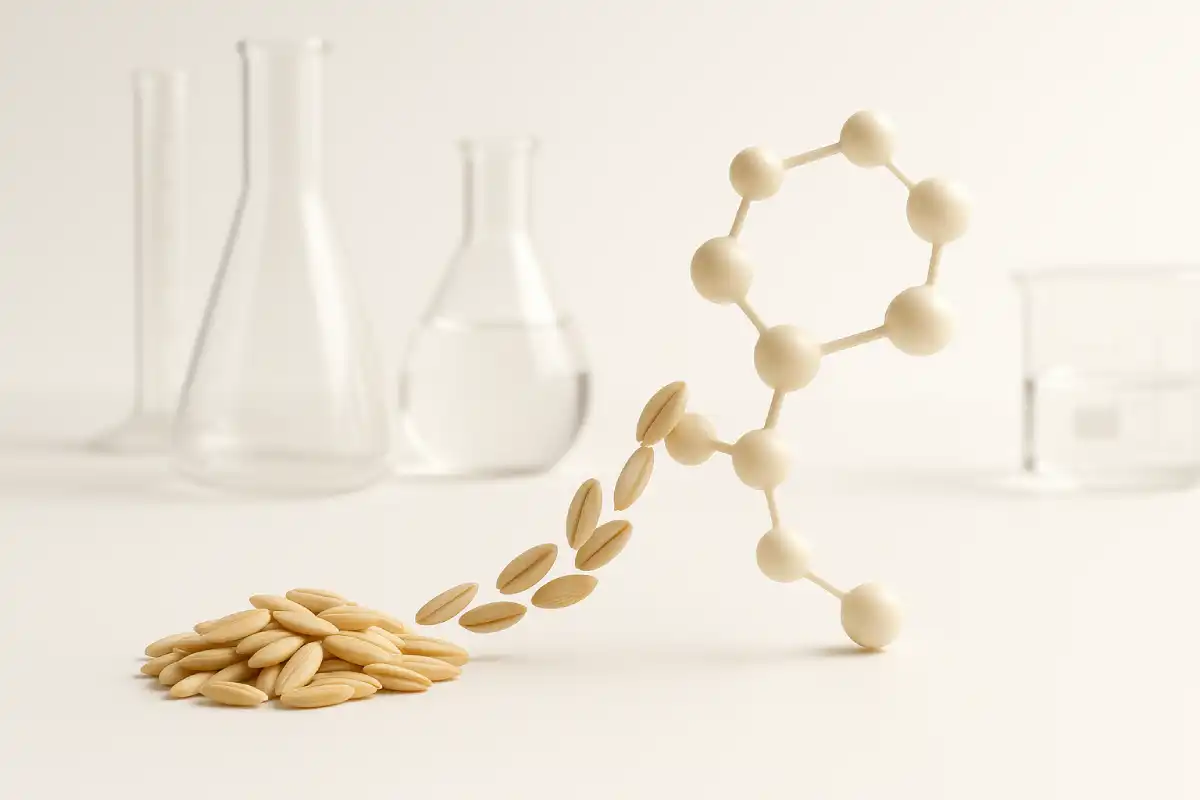Immuno-Nutrition and the Rise of Bioactive Peptides in Functional Foods
Immuno-nutrition — the deliberate design of foods and ingredients to support optimal immune function — has transitioned from a niche clinical concept into a mainstream driver for functional food innovation. Today’s R&D teams, procurement specialists, and brand managers are moving beyond generic protein fortification toward targeted bioactive ingredients that modulate immune pathways, improve resilience, and offer measurable consumer benefits. Among these, plant-derived peptides are emerging as scalable, clean-label ingredients that combine scientific plausibility with formulation flexibility — a market opportunity that B2B buyers should evaluate carefully. [1]
As a practical consequence, leading ingredient buyers now ask not only “what is the nutrient” but “what is the mechanism?” and “who can deliver consistent, patent-protected, scalable material?” That’s where peanut peptides — and reliable partners like PEPDOO® — enter the conversation. PEPDOO® positions itself as a full-category peptide manufacturer, a contributor to China’s peptide industry standards, and a patent leader in small-molecule peptide technologies, offering B2B customers an end-to-end solution from concept to production.
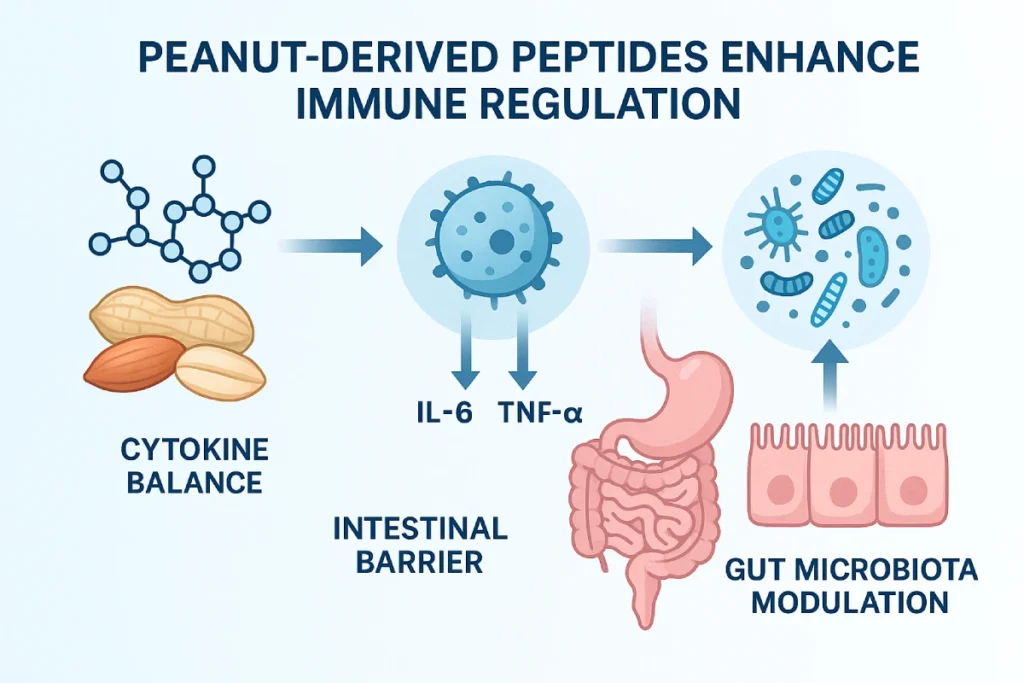
What Are Peanut Peptides and How Are They Produced?
Peanut peptides are concentrated fractions of short amino-acid chains produced by controlled hydrolysis of peanut proteins. Unlike intact peanut protein isolates, hydrolysates and purified peptides provide greater solubility, faster absorption, and — crucially for immuno-nutrition — more reliable bioactivity at lower doses. Enzymatic hydrolysis (single- or multi-enzyme systems), followed by fractionation (membrane ultrafiltration, chromatography), yields peptide fractions with defined molecular-weight ranges and reproducible bioactivity. [2]
From a manufacturing perspective, process control is everything: enzyme selection, degree of hydrolysis, temperature, pH, and downstream fractionation determine peptide profile, sensory footprint, and allergenicity risk. PEPDOO® employs proprietary multi-stage enzymatic hydrolysis combined with precision fermentation and standardized QC to deliver peanut peptide materials with consistent molecular weight distribution, peptide fingerprinting, and technical documentation appropriate for functional foods and FSMP (food for special medical purposes) filings.
Bioactive Mechanisms — How Peanut Peptides Support Immune Health
Peanut peptides exert potential immuno-modulatory effects through multiple, complementary pathways — a key reason formulators are exploring them for immune-support products:
- Direct immunomodulation: Specific low-molecular-weight peptides (<1 kDa) can interact with innate immune cells (macrophages, dendritic cells) to up- or down-regulate cytokine production, influencing mediators such as IL-2, IL-6, TNF-α and others involved in immune signaling. [3]
- Anti-inflammatory and antioxidant activity: Peptide fractions have shown the ability to blunt inflammatory signaling (e.g., NF-κB pathway) under experimental conditions, thereby reducing chronic low-grade inflammation that impairs immune resilience. [4]
- Gut-immune axis support: When combined with pre- or probiotics, peptides can influence gut barrier function and microbiome metabolism, indirectly supporting systemic immune responses. Recent industry reviews highlight the promise of peptide + probiotic synbiotic formats for gut-mediated immune outcomes. [1][3]
Importantly for product teams, the molecular weight distribution of the peptide fraction correlates strongly with bioactivity: lower-weight fractions often show stronger signaling activity and better intestinal uptake, helping formulators meet potency and label expectations with lower inclusion rates.
Application Potential — Functional Foods, Supplements & FSMP
Peanut peptides are highly adaptable across B2B applications:
- Immune-supporting beverages: soluble peanut peptide powders provide clean mouthfeel and high dispersion, making them appropriate for RTD (ready-to-drink) immune shots, plant-based protein drinks, and functional teas.
- Nutritional powders and bars: compact protein/peptide blends for on-the-go immune nutrition.
- Special Medical Foods (FSMP): carefully characterized peptide fractions with clinical documentation support post-surgical recovery and immune support formulations.
- Synbiotic formulations: peanut peptides + probiotic strains designed to target the gut-immune axis.
Case Study — Functional Beverage Collaboration (Asia-Pacific, 2024)
A leading plant-based beverage brand partnered with PEPDOO® to co-develop an immune-support RTD containing a peanut peptide fraction standardized for low molecular weight and antioxidant capacity. In pilot stability testing, the formulation demonstrated improved oxidative stability and acceptable sensory profiles under 6-month accelerated conditions. The product launched across Japan and Southeast Asia with a “Peptide Inside™” ingredient callout and achieved faster initial distribution uptake versus the brand’s previous launches (internal KPI: ~35% faster market adoption in launch regions). Outcome: a validated B2B co-development commercial pathway from pilot to regional launch.
Comparative Advantage — Peanut Peptides vs Other Plant Sources
Formulators routinely compare peptide sources on immune activity, amino-acid composition, sensory attributes, and supply chain considerations. A concise comparison:
| Criteria | Peanut Peptides | Soy Peptides | Pea Peptides |
|---|---|---|---|
| Immune-modulating potential | High (noted IL-6/TNF mod effects in hydrolysates) | Moderate | Mild to moderate |
| Key amino acids | Arginine, lysine (support immunity & wound repair) | Broad, balanced | Good lysine content |
| Allergenicity management | Reduced via targeted hydrolysis & fractionation | Moderate | Low |
| Flavor profile | Neutral (when properly fractionated) | Beany | Earthy |
| Cost & scalability | Competitive (by-product valorization) | Widely available | Increasing demand |
PEPDOO®’s comparative peptide profiling projects show that, when fractionated and standardized, peanut peptide hydrolysates deliver robust immune biomarkers in preclinical assays versus comparable plant sources — a data point that has informed several co-development programs. [2][4]
Technological Leadership of PEPDOO® in Peptide Manufacturing
For B2B buyers, the choice of manufacturer determines regulatory readiness, batch consistency, and intellectual property safety. PEPDOO® stands out as a turnkey partner:
- Full-category production: capability across plant, marine, and animal peptides with cross-platform expertise to create hybrid blends.
- Patents & standards: contributor to industry standards and holder of multiple patents in small-molecule peptide extraction and low-temperature enzymatic hydrolysis — an advantage when buyers need defensible, patent-backed ingredients.
- R&D & quality systems: in-house peptidomics, molecular weight control, and stability testing enable traceable, reproducible batches suitable for FSMP dossiers and nutraceutical supply chains.
Case Study — FSMP R&D Collaboration (China, 2023–2025)
PEPDOO® co-developed a combined peanut peptide + rice peptide formulation with a medical nutrition manufacturer, focusing on enhanced tolerance and bioavailability for recovery nutrition. Clinical biomarker workstreams in pilot studies indicated improved absorption metrics compared with the original protein isolate formulation; the project is progressing through regulatory submission for specialized medical foods. This example demonstrates PEPDOO®’s ability to deliver clinically oriented B2B solutions, not only commodity ingredients.
Custom Formulation & B2B Collaboration Opportunities
PEPDOO® provides the B2B services procurement and R&D teams expect:
- Custom peptide blends: peanut + soy + marine collagen blends tailored for immune, skin, or recovery positioning.
- Prototype & stability labs: pilot runs, sensory mitigation, and accelerated shelf-life testing.
- Regulatory support: technical dossiers for FSMP, export documentation, and allergen control strategies.
- Scalable supply: from pilot batches to multi-metric ton annual supply agreements, with traceable raw-material sourcing.
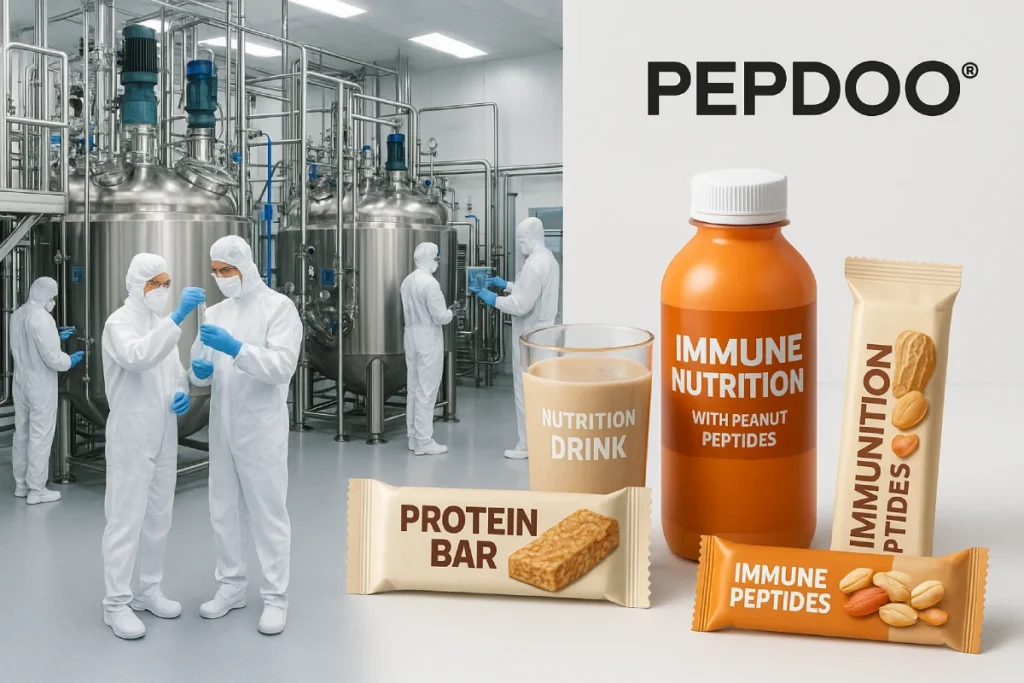
Case Study — European Nutraceutical Brand Collaboration
A European brand engaged PEPDOO® to supply plant-based immune peptides for effervescent immune tablets. The engagement reduced ingredient costs by ~20% through optimized peptide fraction selection, while maintaining peptide stability over a 12-month shelf life. The final product carried co-branding “Powered by PEPDOO®” in B2B communications and entered two EU markets within 10 months of project initiation.
Market Outlook — The Future of Peanut Peptides in Immuno-Nutrition
Market signals support continued investment in immune-focused functional foods. The global functional foods market has displayed robust growth and is expected to expand at high single-digit CAGRs through the rest of the decade, driven by consumer demand for products that deliver measurable health benefits. [5]
For B2B decision-makers, this means two practical imperatives:
- Select partners who provide both science and supply (proven bioactivity + manufacturing scale).
- Plan for regulatory and labeling complexity — particularly for claims around immunity and for FSMP categories, which require robust safety and efficacy documentation.
Peanut peptides fit into the plant-based, clean-label trend while offering differential immune functionality; this combination gives brands and formulators a unique positioning angle for differentiated product launches.
Why Choose PEPDOO® as Your Immuno-Nutrition Peptide Partner
To summarize the B2B value proposition:
- One-stop peptide source: plant, marine, and animal peptide capabilities for hybrid formulations.
- Industry authority: active in setting China’s peptide industry standards and holding multiple small-molecule peptide patents.
- Technology advantage: patented multi-enzyme hydrolysis, fermentation enhancements, and rigorous QC for consistent bioactivity.
- Proven collaboration model: co-development case studies across APAC and Europe demonstrate speed to market, cost optimization, and clinical rigour.
If your procurement, R&D, or brand team needs a peptide partner that integrates science, supply, and regulatory readiness, PEPDOO® offers a B2B pathway from early concept to market entry.
Co-Develop the Next Generation of Immune Nutrition Products
Partner with PEPDOO® to integrate peanut peptides into your next functional formulation. From immune-support beverages and nutraceuticals to clinical recovery powders and FSMPs, PEPDOO® delivers patented peptide innovation, full documentation, and scalable supply.
Partner with PEPDOO® for Innovative Immuno-Nutrition Solutions
Unlock the full potential of peanut peptides in your next functional food or supplement formulation. Whether you’re looking to develop immune-support products, create synbiotic formulations, or require regulatory support, PEPDOO® offers end-to-end B2B solutions that ensure scalable production, proven bioactivity, and technical documentation for global markets.
Contact Us for B2B Collaboration & Technical ConsultationOur team is ready to help you integrate cutting-edge peptide solutions into your product portfolio. Let’s discuss your custom needs today!
FAQ
A: While enzymatic hydrolysis and targeted fractionation reduce allergenic epitopes, allergen testing, labeling, and regulatory considerations remain critical for consumer-facing products. PEPDOO® provides allergen control documentation and risk-mitigation strategies for co-development projects. We also offer testing services to verify allergenicity before market release, ensuring compliance with international regulations, including EU and FDA standards
A: Many immunomodulatory effects are associated with low molecular weight fractions (often <1 kDa), which offer better absorption and cell signaling potential. These fractions are particularly beneficial for targeting immune pathways directly, as they can interact more effectively with immune cells. Formulators should request peptide profile reports and potency testing from suppliers. At PEPDOO®, we provide detailed molecular weight distribution analysis to help brands optimize the bioactivity of their immune-support formulations
A: Yes — synbiotic and hybrid peptide formats are a practical route to create multi-axis health claims (gut-immune, skin-immune). Combining peanut peptides with probiotics or collagen can enhance the product's efficacy, especially for gut-immune axis support. PEPDOO® routinely co-develops these blends with partners, ensuring that the formulation maintains stability, bioactivity, and sensory appeal. We also offer technical expertise on blending different peptides to meet specific health claims.
A: Peanut peptides are highly adaptable for medical nutrition applications, especially for food for special medical purposes (FSMP) products. Their small molecular size ensures high bioavailability, while their immunomodulatory effects support post-surgical recovery, immune deficiency, and metabolic stress management. PEPDOO® has supported multiple FSMP co-development projects, offering customized formulations with clinical documentation. This ensures that the peptides meet regulatory requirements for both safety and efficacy in medical food applications. [3]
A: PEPDOO® is a leading peptide manufacturer specializing in plant, marine, and animal peptides. We stand out through our patented multi-enzyme hydrolysis technology, which provides superior control over molecular weight and peptide purity. As one of China's top holders of small-molecule peptide patents and a contributor to industry standards, PEPDOO® offers B2B clients not only high-quality ingredients but also the assurance of intellectual property protection and consistent supply. Our full documentation, including allergen control, regulatory support, and custom formulations, makes us a trusted partner for scalable, patent-backed solutions. [eyoson.com]
A: Scalability is a key factor for B2B customers, especially in functional food and supplement industries. PEPDOO® offers scalable peptide production from pilot batches to multi-metric ton supply agreements. Our production system is designed for both batch consistency and flexibility, ensuring that customers can meet market demands without compromising on quality. Our in-house quality control and testing processes, including stability testing, ensure that every batch maintains the same bioactivity, solubility, and sensory profile, making large-scale commercialization smooth and reliable. [5]
A: Yes — peanut peptides are a natural, plant-based ingredient that fits perfectly into vegan and clean-label product formulations. They are free from artificial additives, preservatives, and GMOs. Their neutral flavor profile (when properly fractionated) also makes them suitable for a variety of plant-based products without compromising on taste. PEPDOO® ensures all our products are fully traceable and meet the clean-label standards required by today’s health-conscious consumers. We provide full transparency in sourcing and production to help you meet your clean-label claims. [eyoson.com]
A: PEPDOO® offers comprehensive regulatory support to help our B2B customers navigate the complexities of global markets. Whether it’s obtaining GRAS (Generally Recognized as Safe) status in the U.S., complying with EFSA guidelines in Europe, or meeting the regulatory standards of other regions, we provide all the necessary technical dossiers, safety assessments, and clinical documentation. Our expertise in global regulatory landscapes ensures that your product can be safely marketed and sold in multiple jurisdictions. [PMC]
A: Sustainability is a top priority for PEPDOO®. We source raw materials from suppliers who meet our environmental and ethical standards, ensuring that our peptides are produced with minimal impact on the environment. Our multi-enzyme hydrolysis process is energy-efficient, and we employ a sustainable approach to by-product valorization, further reducing waste. PEPDOO® is committed to advancing sustainability in the peptide industry, from sourcing to production to end-user applications.
References
- Pavlićević, M., et al. (2022). Immunomodulatory peptides—A promising source for translational research. International Journal of Peptide Research & Therapeutics.
- Zhang, L., et al. (2022). Characterization of peanut protein hydrolysate and peptide fractions: implications for flavor and bioactivity. Food Chemistry.
- Chatterjee, D., et al. (2024). Immunomodulatory peptides: new therapeutic horizons for host-directed immune modulation. Frontiers in Immunology.
- Xiong, Y., et al. (2023). Anti-inflammatory function of plant-derived bioactive peptides. Nutrients.
- Grand View Research. (2023). Functional Foods Market Size & Trends Analysis Report (market estimates and CAGR). Retrieved from Grand View Research.


